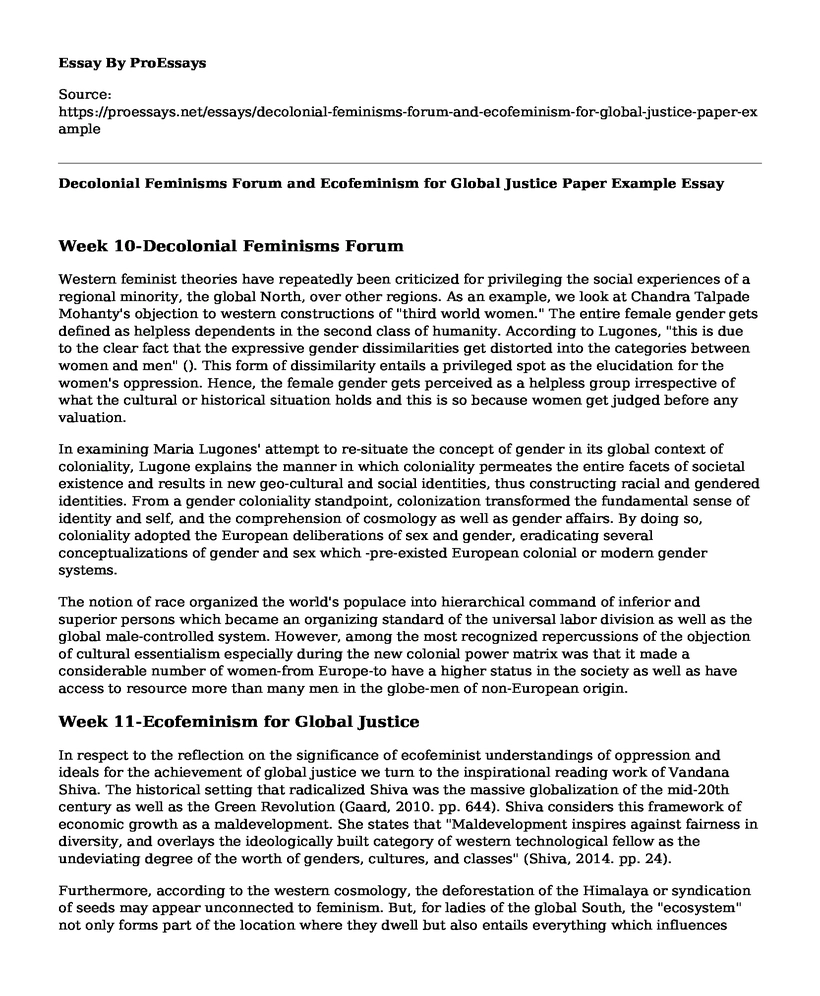Week 10-Decolonial Feminisms Forum
Western feminist theories have repeatedly been criticized for privileging the social experiences of a regional minority, the global North, over other regions. As an example, we look at Chandra Talpade Mohanty's objection to western constructions of "third world women." The entire female gender gets defined as helpless dependents in the second class of humanity. According to Lugones, "this is due to the clear fact that the expressive gender dissimilarities get distorted into the categories between women and men" (). This form of dissimilarity entails a privileged spot as the elucidation for the women's oppression. Hence, the female gender gets perceived as a helpless group irrespective of what the cultural or historical situation holds and this is so because women get judged before any valuation.
In examining Maria Lugones' attempt to re-situate the concept of gender in its global context of coloniality, Lugone explains the manner in which coloniality permeates the entire facets of societal existence and results in new geo-cultural and social identities, thus constructing racial and gendered identities. From a gender coloniality standpoint, colonization transformed the fundamental sense of identity and self, and the comprehension of cosmology as well as gender affairs. By doing so, coloniality adopted the European deliberations of sex and gender, eradicating several conceptualizations of gender and sex which -pre-existed European colonial or modern gender systems.
The notion of race organized the world's populace into hierarchical command of inferior and superior persons which became an organizing standard of the universal labor division as well as the global male-controlled system. However, among the most recognized repercussions of the objection of cultural essentialism especially during the new colonial power matrix was that it made a considerable number of women-from Europe-to have a higher status in the society as well as have access to resource more than many men in the globe-men of non-European origin.
Week 11-Ecofeminism for Global Justice
In respect to the reflection on the significance of ecofeminist understandings of oppression and ideals for the achievement of global justice we turn to the inspirational reading work of Vandana Shiva. The historical setting that radicalized Shiva was the massive globalization of the mid-20th century as well as the Green Revolution (Gaard, 2010. pp. 644). Shiva considers this framework of economic growth as a maldevelopment. She states that "Maldevelopment inspires against fairness in diversity, and overlays the ideologically built category of western technological fellow as the undeviating degree of the worth of genders, cultures, and classes" (Shiva, 2014. pp. 24).
Furthermore, according to the western cosmology, the deforestation of the Himalaya or syndication of seeds may appear unconnected to feminism. But, for ladies of the global South, the "ecosystem" not only forms part of the location where they dwell but also entails everything which influences their lives. According to Shiva, urban, middle-class females acknowledge how challenging it is to distinguish commonality both between the liberation of nature and their freedom, as well as between themselves and several ladies within the globe (Shiva, 2014. pp. 35). This detachment relates to the central bipartisan view of the western cosmology, in which the nature of realism gets classified into contrasting parts and hierarchically structured (Gaard, 2010. pp. 656). As a result, technology gets perceived as superior to natural knowledge; women are inferior to men and human beings as separate to nature (Gaard, 2010. pp. 663).
References
Arvin, M., Tuck, E. and Morrill, A., 2013. Decolonizing feminism: Challenging connections between settler colonialism and heteropatriarchy. Feminist Formations, 25(1), pp.8-34.
Gaard, G., 2010. New directions for ecofeminism: Toward a more feminist ecocriticism. ISLE: Interdisciplinary Studies in Literature and Environment, 17(4), pp.643-665.
Lugones, M., 2010. Toward a decolonial feminism. Hypatia, 25(4), pp.742-759.
Shiva, V., 2014. The Vandana Shiva Reader. University Press of Kentucky: 2(1), pp. 23-49.
Cite this page
Decolonial Feminisms Forum and Ecofeminism for Global Justice Paper Example. (2022, Jun 06). Retrieved from https://proessays.net/essays/decolonial-feminisms-forum-and-ecofeminism-for-global-justice-paper-example
If you are the original author of this essay and no longer wish to have it published on the ProEssays website, please click below to request its removal:
- Article Review Sample: Poverty and Its Effects on Child and Family
- Terrorist Violence Essay
- Terrorism in India: Decades of Risk & Political Intimidation - Research Paper
- Essay Sample on Immigrant's Journey to the American Dream
- Immigration Reform: A Decade of Debate - Essay Sample
- Paper Sample on Obesity Prevalence Among US Children: A Study of California
- Essay Example on Substance Abuse: Understanding the Dependence Syndrome







